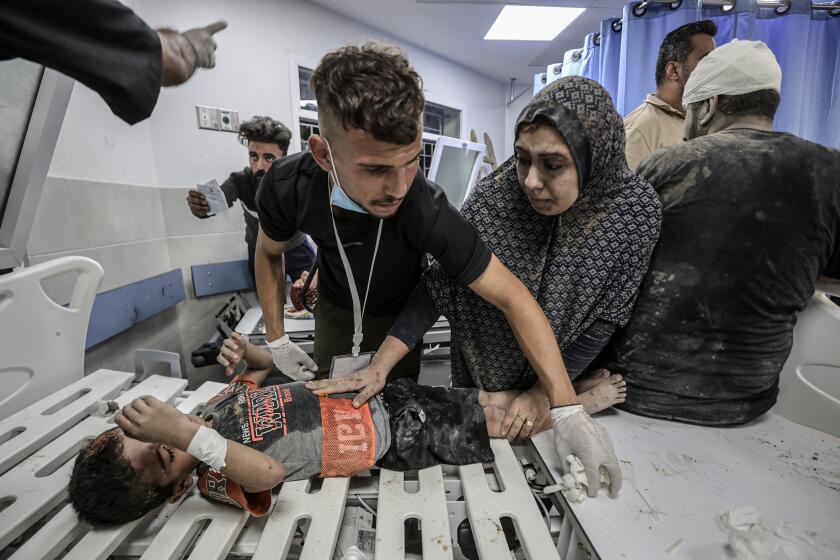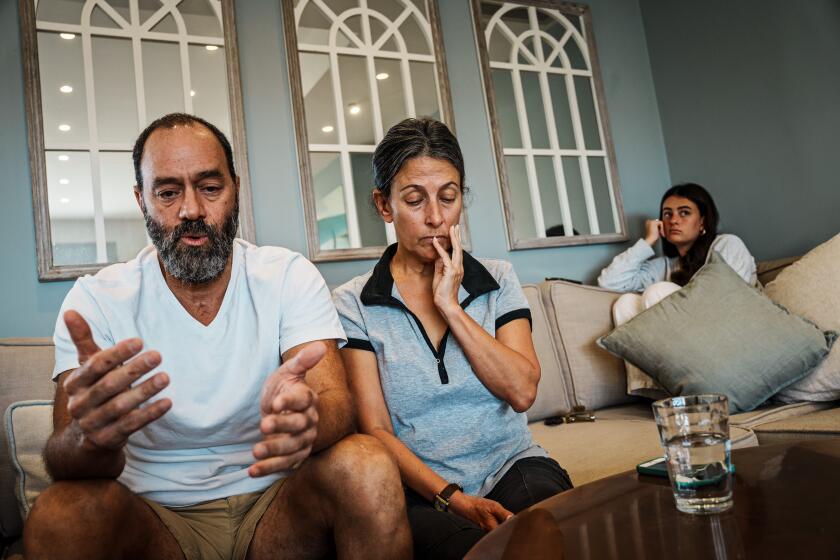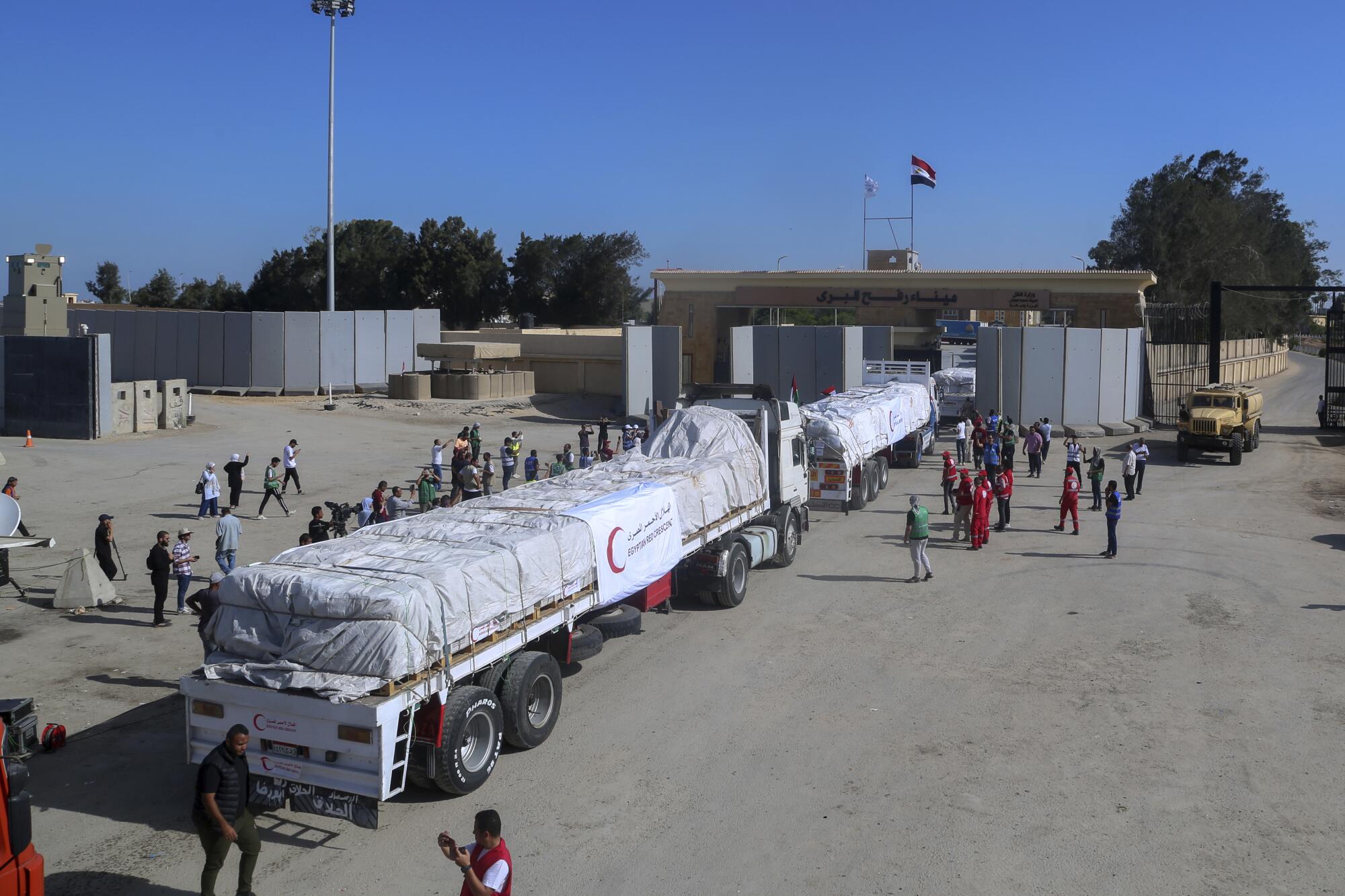
- Share via
RAFAH, Gaza Strip — The border crossing between Egypt and Gaza opened Saturday to let a trickle of desperately needed aid into the besieged Palestinian territory for the first time since Israel sealed it after Hamas’ bloody rampage two weeks ago.
Twenty trucks were allowed in, an amount that aid workers said was insufficient to address the humanitarian crisis in the Gaza Strip. More than 200 trucks carrying roughly 3,000 tons of aid have been waiting nearby for days.
Gaza’s 2.3 million Palestinians, half of whom have fled their homes, are rationing food and drinking dirty water. Hospitals say they are running low on medical supplies and fuel for emergency generators amid a territory-wide power blackout. Five hospitals have stopped functioning because of fuel shortages and bombing damage, the Hamas-run Health Ministry said.
Doctors Without Borders said Gaza’s healthcare system is “facing collapse.”
Israel is launching waves of airstrikes across Gaza as Palestinian militants fire rockets into Israel.
There are growing expectations of a ground offensive that Israel says would be aimed at rooting out Hamas, the Islamic militant group that has ruled Gaza for 16 years. Israel said Friday that it doesn’t plan to take long-term control of the small but densely populated Palestinian territory.
Israeli Prime Minister Benjamin Netanyahu convened his Cabinet late Saturday to discuss the expected invasion, Israeli media reported.
Israel’s military spokesman said the country planned to step up its airstrikes starting Saturday as preparation for the next stage of its war on Hamas. Asked about a possible ground invasion, Rear Adm. Daniel Hagari told reporters the military was trying to create optimal conditions beforehand.
“We will deepen our attacks to minimize the dangers to our forces in the next stages of the war. We are going to increase the attacks, from today,” Hagari said, repeating his call for residents of Gaza City to head south for their safety.
Israel has vowed to crush Hamas but has given few details about what it envisions for Gaza if it succeeds.
Yifat Shasha-Biton, a Cabinet minister, said there was broad consensus in the government that there will have to be a “buffer zone” in Gaza to keep Palestinians away from the border.
“We need to create a distance between the border and our communities,” she told Channel 13 TV, adding that no decisions had been made on its size or other specifics.
In a statement posted early Sunday on X, the site formerly known as Twitter, the Israeli military said it had launched a strike on the Al Ansar Mosque at the Jenin refugee camp in the occupied West Bank. It said a military aircraft struck an “underground terror route” at the mosque, where it said members of Hamas and Islamic Jihad, another militant group, were sheltering.
Tensions have risen in the West Bank, where dozens of Palestinians have been killed in clashes with Israeli troops, arrest raids and attacks by Jewish settlers. Israeli forces have held the West Bank under a tight grip, closing crossings into the territory and checkpoints between cities, measures they say are aimed at preventing attacks.
The opening of Rafah came after more than a week of high-level diplomacy by various mediators, including visits to the region by President Biden and United Nations Secretary-General António Guterres. Israel had insisted that nothing would enter Gaza until some 200 people, mostly civilians, kidnapped by Hamas militants in their Oct. 7 attack on towns in southern Israel are freed.
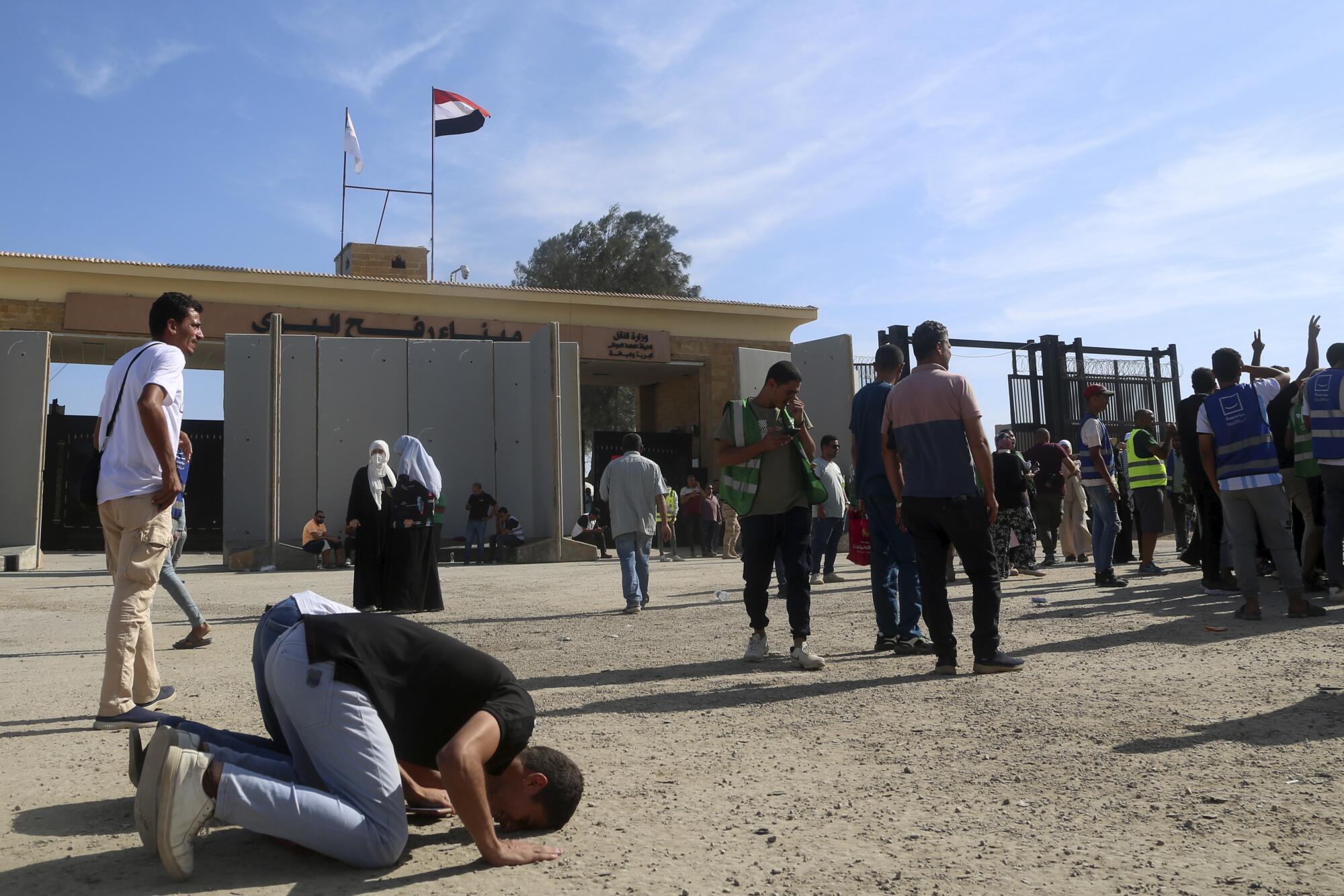
Late Friday, Hamas released an American woman and her teenage daughter, the first captives to be freed. It was not immediately clear whether there was a connection between the release and the aid deliveries. Israel says Hamas is still holding at least 210 captives.
On Saturday morning, an Associated Press reporter on the Palestinian side of Rafah saw the 20 trucks heading north to Deir al Balah, a quiet farming town where many evacuees from the north have sought shelter. Hundreds of foreign passport holders at Rafah hoping to escape the conflict were not allowed to leave.
American citizen Dina al-Khatib said she and her family were desperate to get out. “It’s not like previous wars,” she said. “There is no electricity, no water, no internet, nothing.”
The trucks were carrying 44,000 bottles of drinking water from the U.N.’s children’s agency — enough for 22,000 people for a single day, it said. “This first, limited water will save lives, but the needs are immediate and immense,” said UNICEF Executive Director Catherine Russell.
The World Health Organization said four of the 20 trucks were carrying medical supplies, including essential supplies for 300,000 people for three months, trauma medicine and supplies for 1,200 people, and 235 portable trauma bags for first responders.
The head of the U.N.’s World Food Program said the aid was insufficient. “The situation is catastrophic in Gaza,” Cindy McCain told the Associated Press. “We need many, many, many more trucks and a continual flow of aid,” she said, adding that some 400 trucks were entering Gaza daily before the war.
Gaza’s Hamas-run government called for a secure corridor operating around the clock.
After a hospital blast in Gaza, doctors struggling to save lives amid danger and dwindling supplies say they and the medical system are near collapse.
Israeli military spokesman Hagari said that “the humanitarian situation in Gaza is under control.” He said the aid would be delivered only to southern Gaza, where the army has ordered people to relocate, adding that no fuel would enter the territory.
U.S. Secretary of State Antony J. Blinken appealed to all sides to keep the crossing open for crucial aid shipments and warned Hamas to not take the aid.
“Palestinian civilians are not responsible for Hamas’s horrific terrorism, and they should not be made to suffer for its depraved acts,” he said in a statement. “As President Biden stated, if Hamas steals or diverts this assistance it will have demonstrated once again that it has no regard for the welfare of the Palestinian people.’’ It will also make it hard to keep the aid flowing, he said.
More than 1,400 people in Israel have been killed in the war — mostly civilians slain during the Hamas incursion. Palestinian militants have continued to launch rockets at Israel — more than 6,900 since Oct. 7, according to the Israeli military.
Since Israel retaliated with the goal of wiping out Hamas, more than 4,300 people have been killed in Gaza, according to the Hamas-run Health Ministry.
Guterres, meanwhile, gave voice to growing international concern over civilians in Gaza, saying at a Cairo summit that Hamas’ “reprehensible assault” on Israel two weeks ago “can never justify the collective punishment of the Palestinian people.”
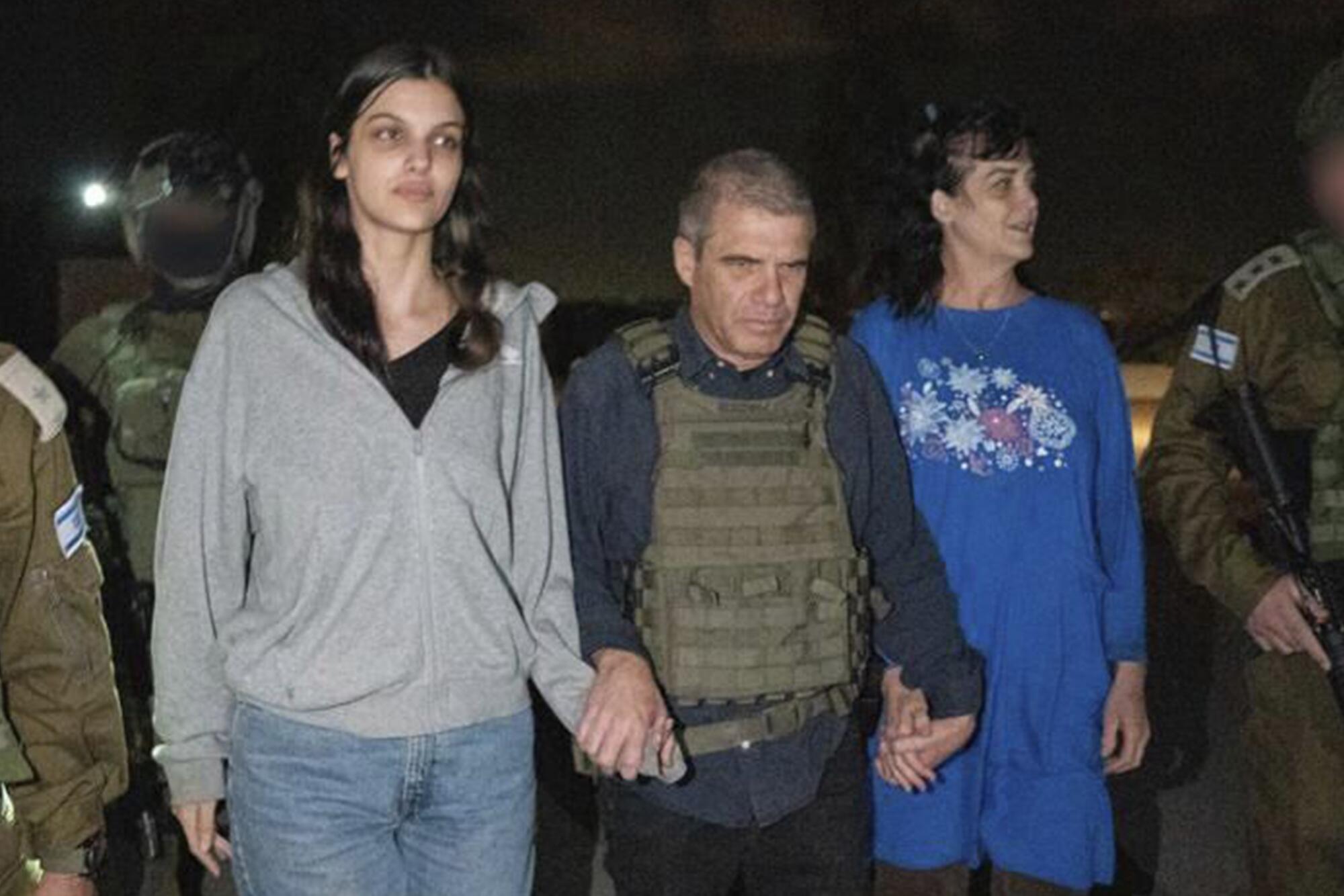
Late Friday, Hamas released Judith Raanan and her 17-year-old daughter, Natalie, for what it said were humanitarian reasons in an agreement with Qatar, a Persian Gulf nation that has often served as a Mideast mediator.
The two had been on a trip from their home in suburban Chicago to Israel to celebrate Jewish holidays, the family said. They were in the kibbutz of Nahal Oz, near Gaza, when Hamas and other militants stormed into southern Israeli towns, killing hundreds of civilians and abducting others.
Hamas said it was working with Egypt, Qatar and other mediators “to close the case” of hostages if security circumstances permit.
California native Hersh Goldberg-Polin, 23, hasn’t been seen by family since before Hamas’ attack on Israel. They’re determined to find him and bring him home.
The Hamas-run Housing Ministry said at least 30% of all homes in Gaza have been destroyed or heavily damaged in the war. That figure does not include the destruction of entire neighborhoods, which the U.N. refugee agency now describes as “inaccessible mounds of rubble.”
Israel has also traded fire along its northern border with Lebanon’s Hezbollah militant group, raising concerns about a second front opening up. The Israeli military said Saturday that it struck Hezbollah targets in Lebanon in response to recent rocket launches and attacks with antitank missiles.
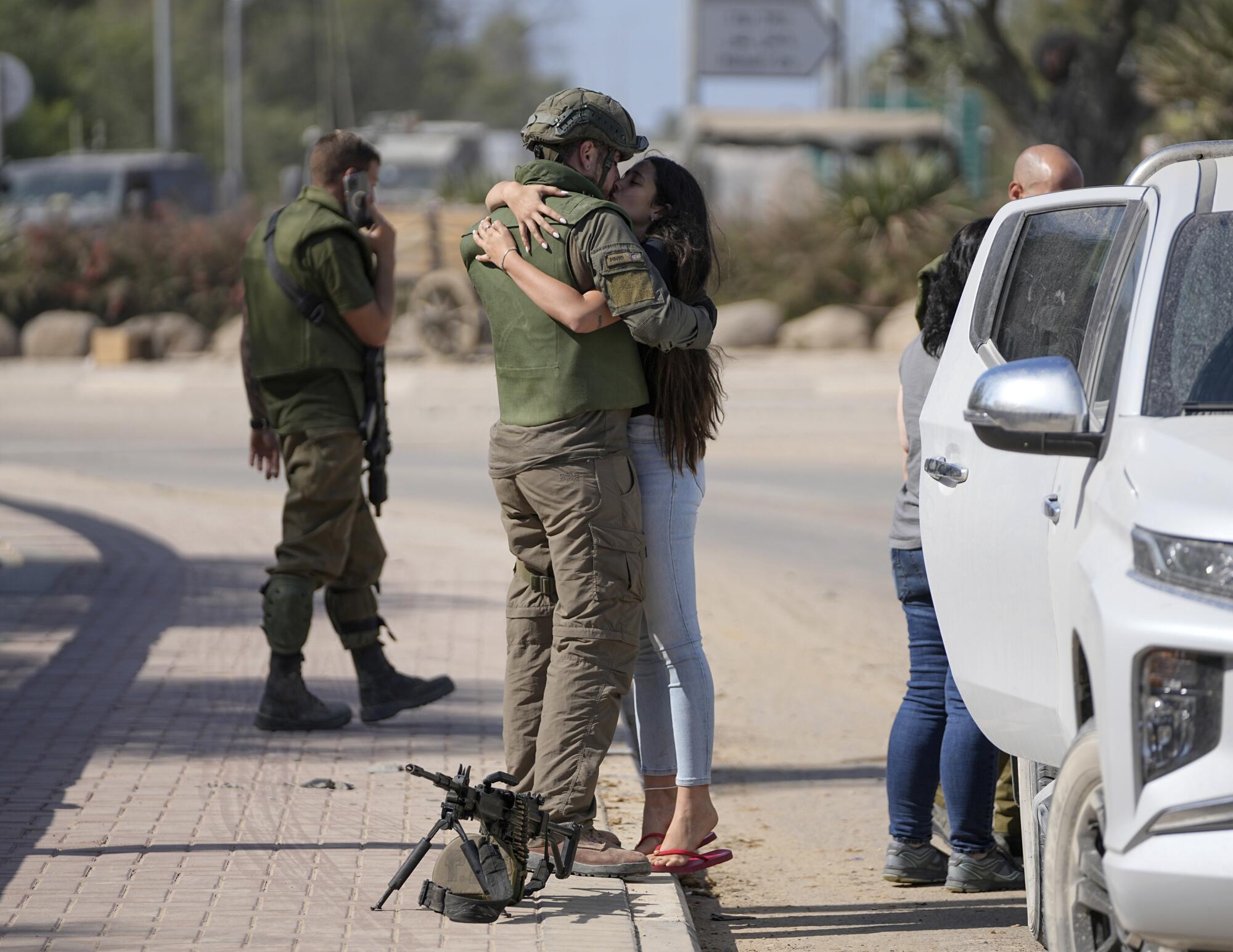
“Hezbollah has decided to participate in the fighting, and we are exacting a heavy price for this,” Israeli Defense Minister Yoav Gallant said during a visit to the border.
Hezbollah said six of its fighters were killed Saturday, and the group’s deputy leader, Sheikh Naim Qassem, warned that Israel would pay a high price if it starts a ground offensive in the Gaza Strip.
Israel issued a travel warning Saturday, ordering its citizens to leave Egypt and Jordan — which made peace with Israel decades ago — and to avoid travel to a number of Arab and Muslim countries, including the United Arab Emirates, Morocco and Bahrain, which forged diplomatic ties with Israel in 2020. Protests against Israel’s actions in Gaza have erupted across the region.
An Israeli ground assault would probably lead to a dramatic escalation in casualties on both sides in urban fighting.
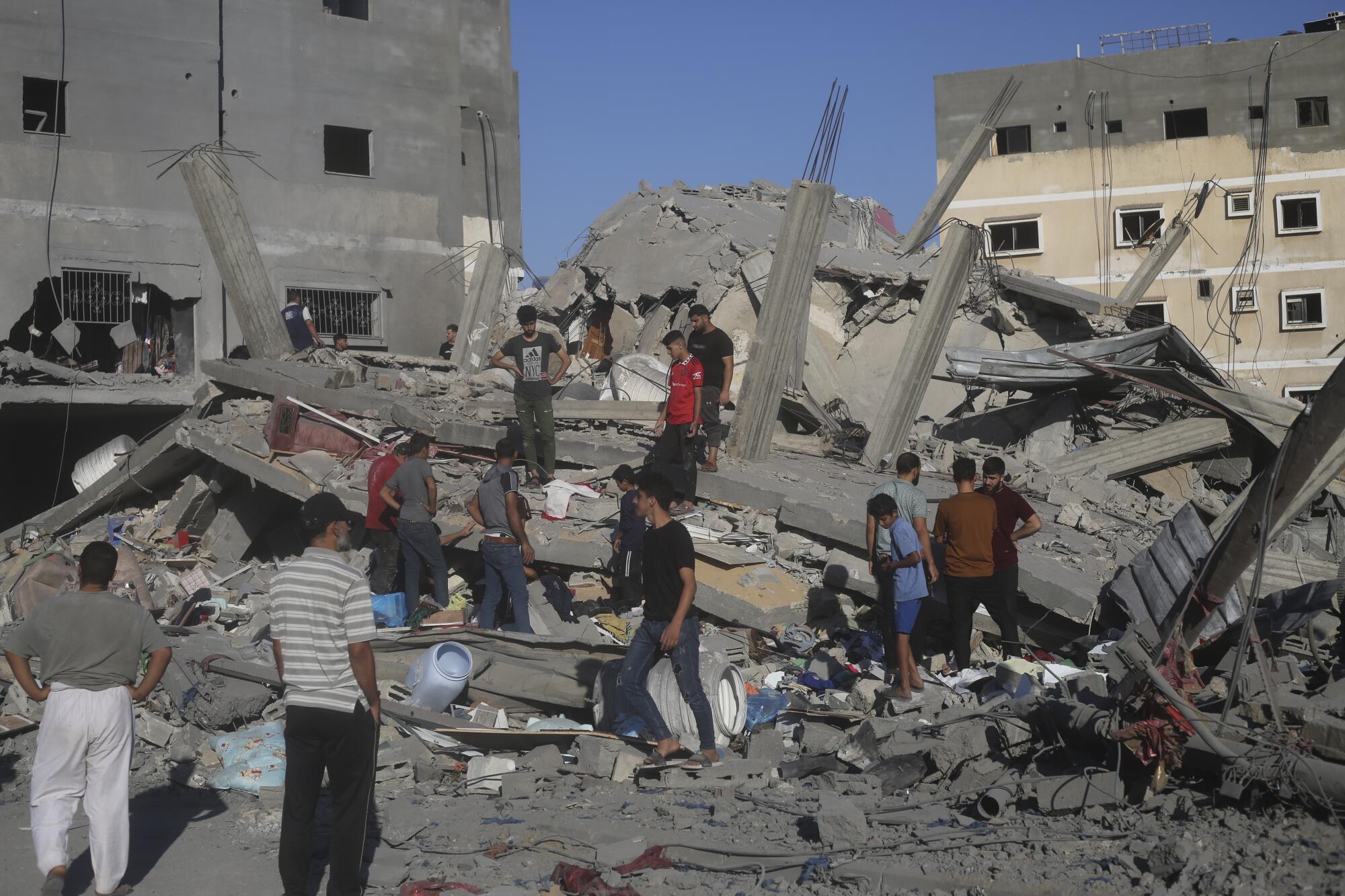
Hosting a summit Saturday, Egyptian President Abdel Fattah Sisi called for ensuring aid to Gaza, negotiating a cease-fire and resuming Israeli-Palestinian peace talks, which last broke down more than a decade ago. He also said the conflict would never be resolved “at the expense of Egypt,” referring to fears Israel may try to push Gaza’s population into the Sinai Peninsula.
King Abdullah II of Jordan told the summit that Israel’s air campaign and siege of Gaza was “a war crime” and slammed the international community’s response.
Breaking News
Get breaking news, investigations, analysis and more signature journalism from the Los Angeles Times in your inbox.
You may occasionally receive promotional content from the Los Angeles Times.
“Anywhere else, attacking civilian infrastructure and deliberately starving an entire population of food, water, electricity and basic necessities would be condemned,” he said. Apparently, he added, “human rights have boundaries. They stop at borders, they stop at races, they stop at religions.”
More than a million people have been displaced in Gaza. Many heeded Israel’s orders to evacuate from north to south within the sealed-off coastal enclave. But Israel has continued to bomb areas in southern Gaza where Palestinians had been told to seek safety.
A senior Israeli military official said the air force will not hit the area where aid is being distributed unless rockets, which militants are relentlessly launching at Israel, are fired from there. “It’s a safe zone,” said the official, who spoke on condition of anonymity in order to reveal military information.
The World Food Program said it has an additional 1,025 tons of emergency food waiting to be brought in through Rafah. It said it needs to replenish its “rapidly diminishing supplies” as it expands food assistance from 520,000 people to 1.1 million in the next two months.
More to Read
Sign up for Essential California
The most important California stories and recommendations in your inbox every morning.
You may occasionally receive promotional content from the Los Angeles Times.
